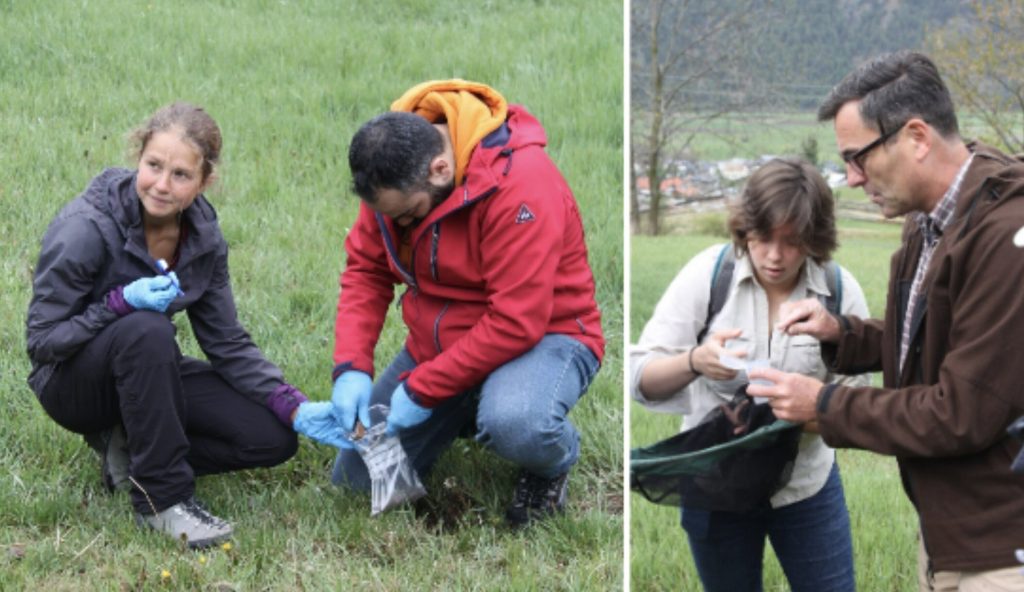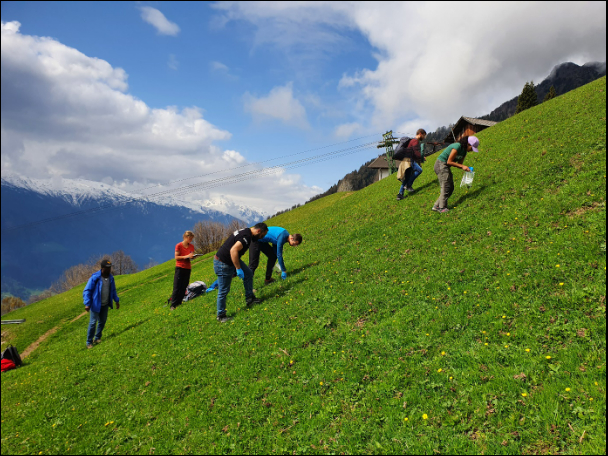In May 2022, a couple of M.Sc. Ecotoxicology students along with Carsten Brühl went to South Tyrol (Italy) to investigate the distribution of pesticides in alpine environments. A part of the group were students from the module Methods in Ecotoxicology, that includes a block lecture and a laboratory test and this year also a field part to perform exposure measurements. The Landau group met with Johann Zaller from BOKU Vienna, author of Daily Poison.
In this blogpost, two of those students, Ken Mauser and Nina Engelhard, present the reason for going to South Tyrol, some brief details about the study and their experience.
‘’As part of the Master’s program Ecotoxicology – Environmental Pollution Management, we made our way to Mals in South Tyrol, Italy. There, in the middle of the Alps in the long valley “Vinschgau”, apple growing is practiced with increasing intensity. Wherever you look, you see row upon row of trees, bordering the residents’ front yards and tourist trails leading like a tunnel through seemingly endless orchards. In recent decades, the largest contiguous apple-growing area in Europe has been created here (18.400 ha). In total, farmers produce 950.000 tons of apples every year.
For our project we were based in Mals. Due to its location at the higher end of the valley, Mals is the last spot that has not yet been completely taken over by apple cultivation. Mals is a village that is known by people interested in the transformation of agriculture, ecologists and ecotoxicologists. A referendum in the community clearly voted for the non-usage of pesticides in the entire community area. The way to the referendum was also made in a movie (Das Wunder von Mals) and is also subject of a book as an example of a public decision on changes in agriculture.

In the lower Vinschgau valley, pesticides have not only been found in playgrounds but some were also recorded in the meltwater of glaciers in nearby mountains. So far, it is not known how much the terrestrial environment is contaminated and if pesticides also reach the higher alpine meadows. Due to their altitude, climate and management without fertilization, alpine meadows represent a unique ecosystem, which is rich in plants and insect life. In connection to a master thesis in the field of ecotoxicology, the question about the distribution of more than 100 current use pesticides in the terrestrial environment will be investigated. Our stay in the Vinschgau gave the students in the course the opportunity to gain practical fieldwork experience, talk to locals about diverse problems arising from increasing intensity of apple cultivation, get first-hand impression of the scale of industrial agriculture and at the same time, contribute to a pioneering study.

During our stay, we took samples of soil and vegetation at 11 transects along the Vinschgau valley. Transects extended from the valley bottom at approximately 800 m to high elevation mountain areas at over 2000 m with sample intervals of 300 m altitude. At each sampling point one composite sample consisting of 25 sub-samples was taken of the upper soil layer (5 cm). Thus, an exact and representative statement about the qualitative presence of the selected target pesticides can be made. Diverse vegetation was sampled by hand picking and clean and precise work along with de-contamination of the equipment after each work step could be practiced by the students.
Each sampling day began with a hearty breakfast, which prepared us for the (sometimes) challenging hike through steep terrain. Small groups of students were formed, each of which were dropped off at the lowest transect point. Left to their own devices, they followed a trail and ascended to the top. Sometimes it was also possible to shorten part of the route with a gondola. The South Tyrolean nature offered unforgettable views, insights into the changing nature by altitude, beautiful hiking trails, small alpine farms, goats, cows, traditional farmers at their daily routine and sometimes even snow fields that had to be crossed.But each day ended well with a wonderful dinner prepared at the Hotel Greif, where we stayed.
The students also profited from the presence of Johann Zaller who was engaged in the project and discussed many points of his work. Additionally, the project was supported locally by Koen Hertoege, now the new president of PAN Europe, who shared all his knowledge about pesticide use and agricultural practice in the Vinschgau with us.
Carsten and Johann also gave a talk invited by the Vinschgau Nature Group at the organic cooperative in Mals. The subject was biodiversity and its current declines and ways to approach the problem. It was an unusual talk, more like a stand-up science discussion as no beamer was involved but instead a conversation on the subject developed that also involved the people attending. And all this with a stunning panorama of the mountains, with the Ortler glaciers in the background slowly dipping in the red of the sunset.
After five days we returned to Landau with many samples to be processed and results to be evaluated. Already the next day, we missed the snow tipped mountains of the Vinschgau.’’

(Photo by Nina Engelhard)
Follow the EcotoxBlog for first results of this trending topic!


